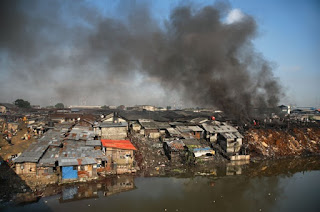 |
| The Cost of Oil - The Atlantic |
An Overview
Beneath the
blackened depths of Nigeria’s Niger Delta, there isn’t an ounce of uncontaminated water to be found. In what was once covered with crystal blue
water has slowly disintegrated into a dark body of oily muck – tarnished, burnt
and crumbled by decades of contamination.
This eerily transformation is not without a catalyst. Decades of oil spills have damned the once thriving Niger Delta into a
hazardous wasteland – and water. Despite
cries of help, the damage on the Niger Delta is ongoing. These destructive oil spills are optimized by
2014 documents that reported Royal Dutch Shell and ENI – two predominant oil
companies – of leaking 204 and 349 spills respectively [1]. All in one
calendar year. Given this, it comes to
no surprise that Nigeria was reported as having the highest oil spills in the
world [2].
Nigeria has
been riddled with decade long oil spills that have severely impacted its people
and environment. The oil pollution has
damaged the Nigerian ecosystem - shutting down avenues for water and food
resources in a country where such access is already severely limited. It’s not only the living organisms that have
suffered, but the severe human cost associated with oil pollution. Hazardous pollutants create a dangerous
predicament for the Nigerian community, families and children. Illness, disease and other health effects are
prevalent, where they are often worsened by the lack of health care in the
country [3]. The Niger Delta acts as a
glaring symbol of the human and ecological costs associated with oil
spills. One that provides a devastating
reminder of the human impacts hat plague the entire country. Yet, it also
showcases the damage that confronts many countries, whose lands have been
continually drilled for oil. Whether it
be the spillage from drilling or transport, the associated damage is profound
[4].
 |
| Price of Oil - Greenpeace UK |
 |
| Niger Delta - National Geographic |
Why it matters....
How does the
Niger Delta relate to us? The human cost
of the Niger Delta is part of a large ripple effect. One that circles back to an excessive need, reliance and use of oil. While most would
attribute oil with gasoline use, many of us are unaware of oil’s ubiquity in our everyday products. These are the taken-for-granted products that
are unconsciously used and sometimes abused.
They can be in the everyday trash bags we use, the disposable bags at
the supermarket, our toothbrushes – even our shampoos! Even as I type this blog post, I can identify
the oil in my keyboard, monitor, the headphones I’m wearing and the speakers
attached to my computer. Oil is
ubiquitous and hidden in the fabric of our everyday lives. You would be hard-pressed to find something not made from oil, crude oil and
petroleum [5]. As the need for oil
increases, lands are continually drilled and a greater chance for destructive
oil spillage is increased around the world.
This aim of
this post is not to guilt you from using oil products altogether. It is also not meant to scare you from using
products containing oil. It is meant to
be an eye-opening look at the ubiquity of such everyday products. An effort to draw attention to our unconscious
use of oil, crude oil and petroleum products.
At its core, the devastating and damaging oil spills in Nigeria
showcases the sheer amount of oil
being distributed around the world. As
it relates to the everyday products we use, individuals must gain a stronger awareness
of hidden oil. The costs are real and
the future of oil scarcity is not inconceivable. It’s important for individuals to be aware of these issues and of oil usage. Only from awareness can we truly reflect on
the hidden cost of oil and what it means. A major cost? One would have to look no
further than the utter decay of the Niger Delta to understand its sheer impact
and why this matters.
Direct links for further reading:
Direct links for further reading:
References and Resources:
[1] Nigeria: Hundreds of oil spills continue to blight Niger Delta. (2015, March 9). Retrieved from https://www.amnesty.org/en/latest/news/2015/03/hundreds-of-oil-spills-continue-to-blight-niger-delta/
[2] Umoru, H. (2012, November 14). Nigeria has highest oil spill in the world. Retrieved from http://www.vanguardngr.com/2012/11/nigeria-has-highest-oil-spill-in-the-world-senate/
[3] Edoigiawerie, C., & Spickett, J. (1995, May 2). The environmental impact of petroleum on the environment. Retrieved from https://www.ncbi.nlm.nih.gov/pubmed/12160434
[4] Spooner, A. M. (n.d.). Environmental impact of petroleum and natural gas. Retrieved from http://www.dummies.com/education/science/environmental-science/what-is-the-environmental-impact-of-petroleum-and-natural-gas/
[5] The hidden, but vast, world of petroleum products. (n.d.). Retrieved from http://www.oilandgasinfo.ca/hidden-vast-world-petroleum-products/
Niger Delta [Online image]. (2007). Retrieved February 1, 2017 from http://ngm.nationalgeographic.com/2007/02/nigerian-oil/oneill-text
Price of oil [Online image]. (2011). Retrieved February 1, 2017 from http://www.greenpeace.org.uk/blog/climate/price-oil-shell-niger-delta-20111007
The cost of oil [Online image]. (2011). Retrieved February 1, 2017 from http://www.theatlantic.com/photo/2011/06/nigeria-the-cost-of-oil/100082/
|

No comments:
Post a Comment